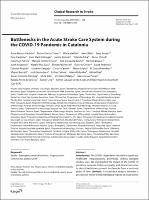| dc.contributor | Hospital General de Granollers |
| dc.contributor.author | Ramos-Pachon, Anna |
| dc.contributor.author | Millán, Mónica |
| dc.contributor.author | Ribó Jacobi, Marc |
| dc.contributor.author | Amaro, Sergi |
| dc.contributor.author | Cardona, Pere |
| dc.contributor.author | Cocho, Dolores |
| dc.contributor.author | Garcia-Tornel, Alvaro |
| dc.date.accessioned | 2021-10-22T14:36:33Z |
| dc.date.available | 2021-10-22T14:36:33Z |
| dc.date.issued | 2021-05-21 |
| dc.identifier.citation | Ramos-Pachón A, García-Tornel A, Millán M, Ribó M, Amaro S, Cardona P, et al. Bottlenecks in the Acute Stroke Care System during the COVID-19 Pandemic in Catalonia. Cerebrovasc Dis. 2021;50(5):551-559. |
| dc.identifier.uri | https://hdl.handle.net/11351/6457 |
| dc.description | Accident cerebrovascular; Serveis mèdics d'emergència; Coronavirus SARS-CoV-2; COVID-19; 2019-nCoV |
| dc.description.abstract | Introduction: The COVID-19 pandemic resulted in significant healthcare reorganizations, potentially striking standard medical care. We investigated the impact of the COVID-19 pandemic on acute stroke care quality and clinical outcomes to detect healthcare system's bottlenecks from a territorial point of view.
Methods: Crossed-data analysis between a prospective nation-based mandatory registry of acute stroke, Emergency Medical System (EMS) records, and daily incidence of COVID-19 in Catalonia (Spain). We included all stroke code activations during the pandemic (March 15-May 2, 2020) and an immediate prepandemic period (January 26-March 14, 2020). Primary outcomes were stroke code activations and reperfusion therapies in both periods. Secondary outcomes included clinical characteristics, workflow metrics, differences across types of stroke centers, correlation analysis between weekly EMS alerts, COVID-19 cases, and workflow metrics, and impact on mortality and clinical outcome at 90 days.
Results: Stroke code activations decreased by 22% and reperfusion therapies dropped by 29% during the pandemic period, with no differences in age, stroke severity, or large vessel occlusion. Calls to EMS were handled 42 min later, and time from onset to hospital arrival increased by 53 min, with significant correlations between weekly COVID-19 cases and more EMS calls (rho = 0.81), less stroke code activations (rho = -0.37), and longer prehospital delays (rho = 0.25). Telestroke centers were afflicted with higher reductions in stroke code activations, reperfusion treatments, referrals to endovascular centers, and increased delays to thrombolytics. The independent odds of death increased (OR 1.6 [1.05-2.4], p 0.03) and good functional outcome decreased (mRS ≤2 at 90 days: OR 0.6 [0.4-0.9], p 0.015) during the pandemic period.
Conclusion: During the COVID-19 pandemic, Catalonia's stroke system's weakest points were the delay to EMS alert and a decline of stroke code activations, reperfusion treatments, and interhospital transfers, mostly at local centers. Patients suffering an acute stroke during the pandemic period had higher odds of poor functional outcome and death. The complete stroke care system's analysis is crucial to allocate resources appropriately. |
| dc.language.iso | eng |
| dc.publisher | Karger |
| dc.relation.ispartofseries | Cerebrovascular diseases (Basel, Switzerland);50(5) |
| dc.rights | Attribution-NonCommercial 4.0 International |
| dc.rights.uri | http://creativecommons.org/licenses/by-nc/4.0/ |
| dc.source | Scientia |
| dc.subject | Malalties cerebrovasculars |
| dc.subject | Urgències mèdiques, Serveis d' |
| dc.subject | COVID-19 (Malaltia) |
| dc.subject.mesh | Stroke |
| dc.subject.mesh | Emergency Service, Hospital |
| dc.subject.mesh | Coronavirus Infections |
| dc.title | Bottlenecks in the Acute Stroke Care System during the COVID-19 Pandemic in Catalonia |
| dc.type | info:eu-repo/semantics/article |
| dc.identifier.doi | 10.1159/000516309 |
| dc.subject.decs | accidente cerebrovascular |
| dc.subject.decs | servicios médicos de urgencia |
| dc.subject.decs | infecciones por Coronavirus |
| dc.relation.publishversion | https://doi.org/10.1159/000516309 |
| dc.type.version | info:eu-repo/semantics/publishedVersion |
| dc.audience | Professionals |
| dc.contributor.authoraffiliation | [Ramos-Pachón A, Millán M ] Stroke Unit, Hospital Germans Trias i Pujol, Badalona, Spain. [García-Tornel A] Unitat d’Ictus, Vall d’Hebron Hospital Universitari, Barcelona, Spain. Vall d’Hebron Institut de Recerca (VHIR), Barcelona, Spain. [Ribó M] Vall d’Hebron Hospital Universitari, Barcelona, Spain. Vall d’Hebron Institut de Recerca (VHIR), Barcelona, Spain. [Amaro S] Stroke Unit, Hospital Clínic, Barcelona, Spain. [Cardona P] Stroke Unit, Hospital Universitari Bellvitge, Hospitalet de Llobregat, Spain. [Cocho D] Hospital General de Granollers, Granollers, Spain |
| dc.identifier.pmid | 34023822 |
| dc.rights.accessrights | info:eu-repo/semantics/openAccess |

